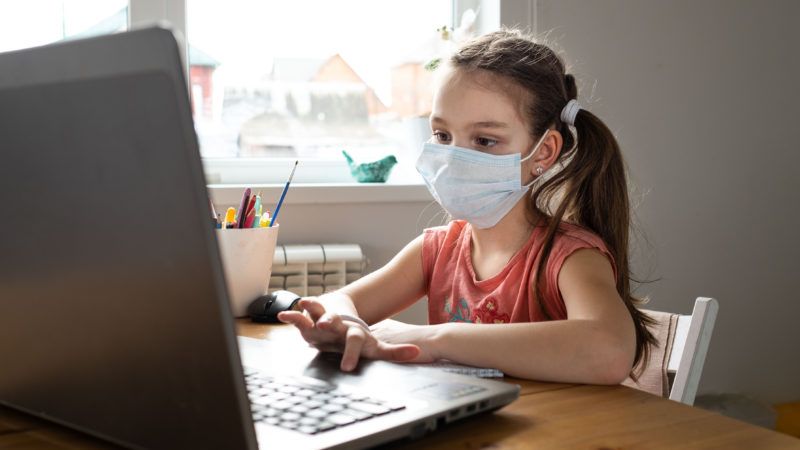Researchers are shocked–SHOCKED–to only now start understanding the massive detrimental learning loss of closing schools due to Covid-19, many for over a year, and the long-term effects it will have on children for years to come.
With politicians and school boards now forced to reckon with their decision to keep children at home, learning on their computers, for extended periods of time, the results are not pretty. Children suffered setbacks of well over a year of lost learning, in many cases, and this type of impairment will take years to correct. Some students don’t have that kind of time, and others will never fully recover from the lost learning experience that only in-classroom learning can provide.
In Europe, where schools closed more transiently than they did in America, the end product of even short-term periods of virtual learning has proved to be seriously determinantal to educational development:
Nearly two years after the pandemic forced school closures around the world, countries are once again grappling with whether to reopen classrooms, as holiday breaks draw to a close amid a surge in the omicron variant. But this time, officials have more information about the costs of closing schools and pivoting to virtual learning — if even for just a few weeks.
The experience in Europe is especially relevant because schools here were shut for far shorter periods than those in the United States. Evidence is emerging that European students, even though they attended school in-person through most of the pandemic, experienced significant academic setbacks.
Test scores dropped. Attendance waned. And teachers worried that their students were unprepared for the next school year.
In many cases, school districts in the United States simply stopped using standardized tests for fear of the results. Putting proof on paper that kids were crashing and burning in a home-learning environment would be further fuel to parents demanding a return to in-person classroom education.
Some researchers, more than others, have been willing to speak bluntly about the issue pointing out that not only was virtual learning bad for kids, it basically amounted to learning nothing:
Per Engzell, a researcher at Oxford University’s Leverhulme Centre for Demographic Science, says those weeks were a waste in terms of academic learning.
“What we learned from our study is that children learned basically nothing at home,” Engzell said. “And it’s clear that this learning loss has not been completely recovered, even now, one and a half years later.”
He found in his April 2021 study that elementary students performed on average 20 percent worse on tests than the equivalent cohorts had for the three years before the pandemic.
This is what parents in places like Virginia were fighting for when they tossed out Democrats from state government and elected Glenn Youngkin, a Republican who pledged to open schools five days a week for in-person learning and never again inflict this educational malpractice on children.
From anecdotal experience speaking with teachers, they say that in many cases the usual classroom divides of kids that excel compared to kids that struggle was only amplified by the scourge of virtual learning.
Children at the bottom end of the class simply fell off the map, with some leaving school entirely, often due to poor home life. Kids in the middle struggled more learning online than they would have in the classroom. The few at the top continued doing acceptable work, but not to the level they would have if they were seated in a classroom listening in person to a teacher.
This kind of anecdotal experience was evident in the Netherlands study as well which found children from disadvantaged households disproportionally struggled more:
Among students from less-advantaged families, learning losses tended to be even greater — up to 60 percent larger than for the general population. The Netherlands has spent billions on tutoring, counseling and summer programming for children, but that extra support has not yet caught them up.
Teachers need to be able to see the faces of children as they absorb the material. Do they understand? Are they following along? Do they look like they have questions they’re afraid to ask?
Teaching is not a one-way street. Students need interaction back and forth. The teacher needs a visual feedback loop to see if the class understands. Virtual learning, by Zoom or any other platform, either removes or seriously hampers that loop with a teacher unable to fully ascertain whether a group of kids understands something or not.
Another part of the study, from Belgium, found that almost all children were now taking some form of remedial classes, some as many as four or five different subjects. This eats into extracurricular time, and time spent learning new material. In essence, kids are spending more time learning over multiple years what they should have learned in one school year.
All of this for a virus that has well over a 99.99% survival rate among school-aged children. For kids with serious comorbidities or other illnesses that made them more susceptible, then virtual learning may have been an option, at least for some period of time at the beginning of Covid-19.
Nothing, however, can replace the straightforward common sense approach of putting kids in a classroom in front of a teacher.
Unfortunately, for many children, especially those in families who cannot afford to pay for extra remedial help to play catch up, they will be set behind years in their education, and some may never fully recover. Imagine the life courses of some children altered by these months and months of lost learning. It’s a crying shame.
